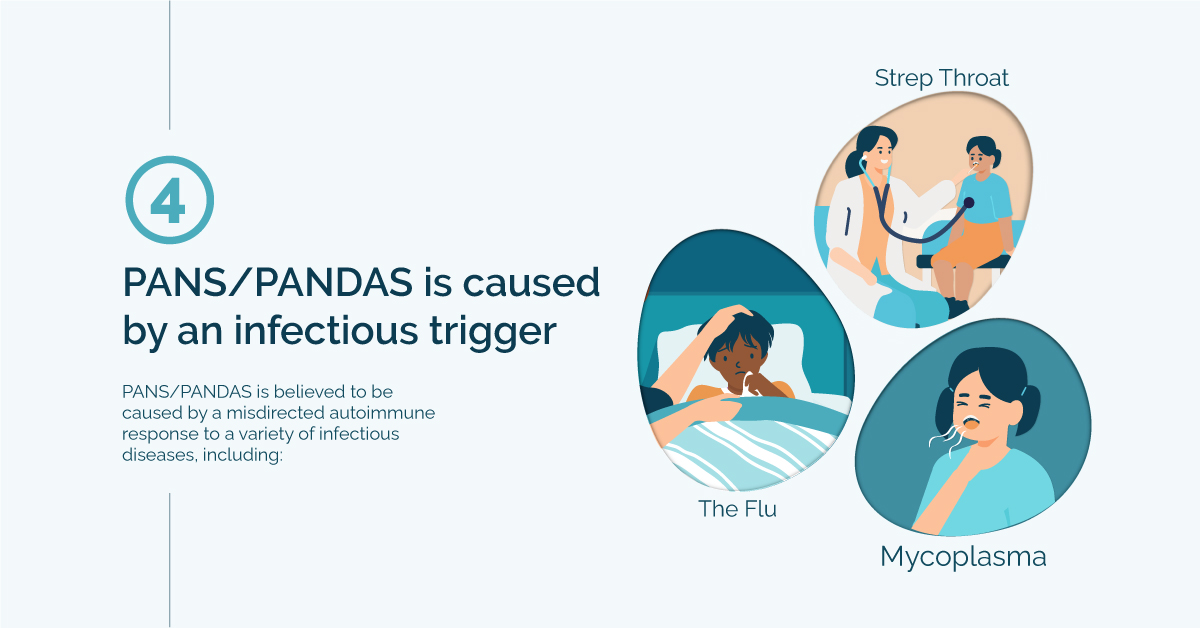What is PANS/PANDAS and Why Should You Care?
The following content is sponsored by the Pace Foundation

What is PANS/PANDAS and Why Should You Care?
Picture this—one moment, you have a healthy, carefree child. Then, overnight, your child becomes a different person. Now they’re moody, anxious, aggressive, compulsively obsessing over trivial things, or restricting their eating.
If this sounds familiar, your child may have Pediatric Acute-onset Neuropsychiatric Syndrome (PANS) or Pediatric Autoimmune Neuropsychiatric Disorders Associated with Streptococcal Disease (PANDAS).
This graphic, sponsored by the PACE Foundation, shares six important facts you should know about PANS/PANDAS, and illustrates how your individual or corporate donations could help cure these autoimmune disorders.
PANS/PANDAS: An Overview
PANS and PANDAS are types of Children’s Postinfectious Autoimmune Encephalopathy (CPAE), which is when your immune system stops functioning properly and starts attacking healthy cells in your body.
These particular autoimmune disorders are triggered by an infection such as strep throat or other streptococcal infections. Below, we’ll dive into six important things to know if you think your child is suffering from either of these autoimmune disorders.
FACT #1
PANS/PANDAS is a pediatric disorder
According to the National Institute of Mental Health (NIMH), PANS/PANDAS is considered a pediatric disorder because it’s most commonly found in children from age three to puberty.
While occurrences in teenagers and adults are possible, they’re extremely rare based on current research. Children that develop PANS/PANDAS are believed to be genetically susceptible to it.
FACT #2
PANS/PANDAS is a clinical diagnosis
PANS/PANDAs cannot be detected in a lab or with a blood test.
Rather, these disorders are detected through a clinical diagnosis, which means they’re identified by observing the symptoms of a patient, combined with their medical history.
The most common signs of PANS/PANDAS are a sudden onset of OCD, severe separation anxiety, vocal or motor tics, or restricted eating.
FACT #3
PANS/PANDAS is often misdiagnosed
It can be difficult to diagnose PANS/PANDAS since symptoms are similar to other disorders, like ADHD or bipolar.
A key characteristic of PANS/PANDAS that differentiates it from ADHD or bipolar disorder is its sudden onset, meaning symptoms appear rapidly, or seem to come out of nowhere.
FACT #4
PANS/PANDAS is caused by an infectious trigger
PANS/PANDAS is believed to be triggered by a misdirected autoimmune response to a variety of infectious diseases.
PANDAS is linked to streptococcal infections like strep throat, while PANS is thought to be triggered by a range of infections or inflammatory reactions.
Treatment for these autoimmune disorders varies, depending on the severity of the symptoms. Some patients take antibiotics, while others need a mix of antibiotics and psychiatric treatments.
FACT #5
Early diagnosis and treatment can lead to improved outcomes
Catching and treating PANS/PANDAS early could make a world of difference to your child’s mental health.
According to Dr. Sue Swedo, former Chief of Development Pediatrics at SNIMH, some preliminary studies indicate that early treatment and proper use of antibiotic prophylaxis may prevent 25-30% of childhood mental illnesses.
FACT #6
The Pace Foundation is helping treat and cure these diseases
The PACE Foundation in collaboration with major medical universities and health institutions in the U.S. has facilitated and promoted special PANS/PANDAS clinics and world-class research to treat patients with these disorders and help eventually cure these very serious diseases.
Working Towards a Cure
The PACE Foundation has made significant contributions to increase awareness, explore treatment options, and invest in research into these autoimmune disorders. Some key moments for the organization over the last decade include:
- 2014-2015: The start of a collaboration between PACE and the NIH/NMIH, the University of Arizona, and Stanford University to develop multi-discipline clinics to treat PANS/PANDAS.
- 2016: The establishment of the first CPAE Center of Excellence & Treatment Clinics, which opened to patients from around the world.
- 2019-2022: Partnered with pharmaceutical corporation (Octapharma) to launch the first ever global pediatric IVIG study for PANS/PANDAS.
- 2022 and Beyond: Beyond the millions of dollars raised to date, for treatment, research and awareness, by collaborating with government academia, foundations and private sector organizations in a national effort to cure PANS/PANDAS.
While the PACE Foundation has made remarkable progress in a short amount of time, financial assistance is needed in order for the non-profit to achieve its research goals, and ultimately cure PANS/PANDAS.
>>>Click here to donate.
-

 Sponsored3 years ago
Sponsored3 years agoMore Than Precious: Silver’s Role in the New Energy Era (Part 3 of 3)
Long known as a precious metal, silver in solar and EV technologies will redefine its role and importance to a greener economy.
-

 Sponsored7 years ago
Sponsored7 years agoThe History and Evolution of the Video Games Market
Everything from Pong to the rise of mobile gaming and AR/VR. Learn about the $100 billion video games market in this giant infographic.
-

 Sponsored8 years ago
Sponsored8 years agoThe Extraordinary Raw Materials in an iPhone 6s
Over 700 million iPhones have now been sold, but the iPhone would not exist if it were not for the raw materials that make the technology...
-

 Sponsored8 years ago
Sponsored8 years agoThe Industrial Internet, and How It’s Revolutionizing Mining
The convergence of the global industrial sector with big data and the internet of things, or the Industrial Internet, will revolutionize how mining works.


